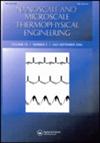石墨材料中集体和非集体声子流之间跃迁的热阻
IF 2.7
3区 工程技术
Q2 ENGINEERING, MECHANICAL
Nanoscale and Microscale Thermophysical Engineering
Pub Date : 2018-12-11
DOI:10.1080/15567265.2019.1575497
引用次数: 8
摘要
摘要与umklapp散射(U散射)相比,石墨材料中的声子表现出较强的法向散射(N散射)。与U散射占主导地位的相对常见的情况不同,强N散射引起集体声子流。如果石墨材料具有有限的尺寸,并且与发射具有非集体分布的声子的热库和冷库接触,则N散射将非集体声子流改变为石墨材料和热库之间界面附近的集体声子流。我们研究了在非集体和集体声子流之间转换过程中通过N散射产生的热阻。Peierls-Boltzmann输运方程的蒙特卡罗解表明,在100、200和300K下,石墨材料中的N散射分别使弹道情况下的热通量减少了约15%、30%和40%。这明显大于具有相似德拜温度(~2300K)的德拜晶体的~5%还原率。我们将N散射导致的热通量的大幅减少与石墨材料的非线性色散和不同群速度下的多个声子分支联系起来。本文章由计算机程序翻译,如有差异,请以英文原文为准。
Thermal Resistance by Transition Between Collective and Non-Collective Phonon Flows in Graphitic Materials
ABSTRACT Phonons in graphitic materials exhibit strong normal scattering (N-scattering) compared to umklapp scattering (U-scattering). The strong N-scattering cause collective phonon flow, unlike the relatively common cases where U-scattering is dominant. If graphitic materials have finite size and contact with hot and cold reservoirs emitting phonons with non-collective distribution, N-scattering change the non-collective phonon flow to the collective phonon flow near the interface between graphitic material and a heat reservoir. We study the thermal resistance by N-scattering during the transition between non-collective and collective phonon flows. Our Monte Carlo solution of Peierls-Boltzmann transport equation shows that the N-scattering in graphitic materials reduce heat flux from the ballistic case by around 15%, 30%, and 40% at 100, 200, and 300 K, respectively. This is significantly larger than ~ 5% reduction of Debye crystal with similar Debye temperature (~2300 K). We associate the large reduction of heat flux by N-scattering with the non-linear dispersion and multiple phonon branches with different group velocities of graphitic materials.
求助全文
通过发布文献求助,成功后即可免费获取论文全文。
去求助
来源期刊

Nanoscale and Microscale Thermophysical Engineering
工程技术-材料科学:表征与测试
CiteScore
5.90
自引率
2.40%
发文量
12
审稿时长
3.3 months
期刊介绍:
Nanoscale and Microscale Thermophysical Engineering is a journal covering the basic science and engineering of nanoscale and microscale energy and mass transport, conversion, and storage processes. In addition, the journal addresses the uses of these principles for device and system applications in the fields of energy, environment, information, medicine, and transportation.
The journal publishes both original research articles and reviews of historical accounts, latest progresses, and future directions in this rapidly advancing field. Papers deal with such topics as:
transport and interactions of electrons, phonons, photons, and spins in solids,
interfacial energy transport and phase change processes,
microscale and nanoscale fluid and mass transport and chemical reaction,
molecular-level energy transport, storage, conversion, reaction, and phase transition,
near field thermal radiation and plasmonic effects,
ultrafast and high spatial resolution measurements,
multi length and time scale modeling and computations,
processing of nanostructured materials, including composites,
micro and nanoscale manufacturing,
energy conversion and storage devices and systems,
thermal management devices and systems,
microfluidic and nanofluidic devices and systems,
molecular analysis devices and systems.
 求助内容:
求助内容: 应助结果提醒方式:
应助结果提醒方式:


